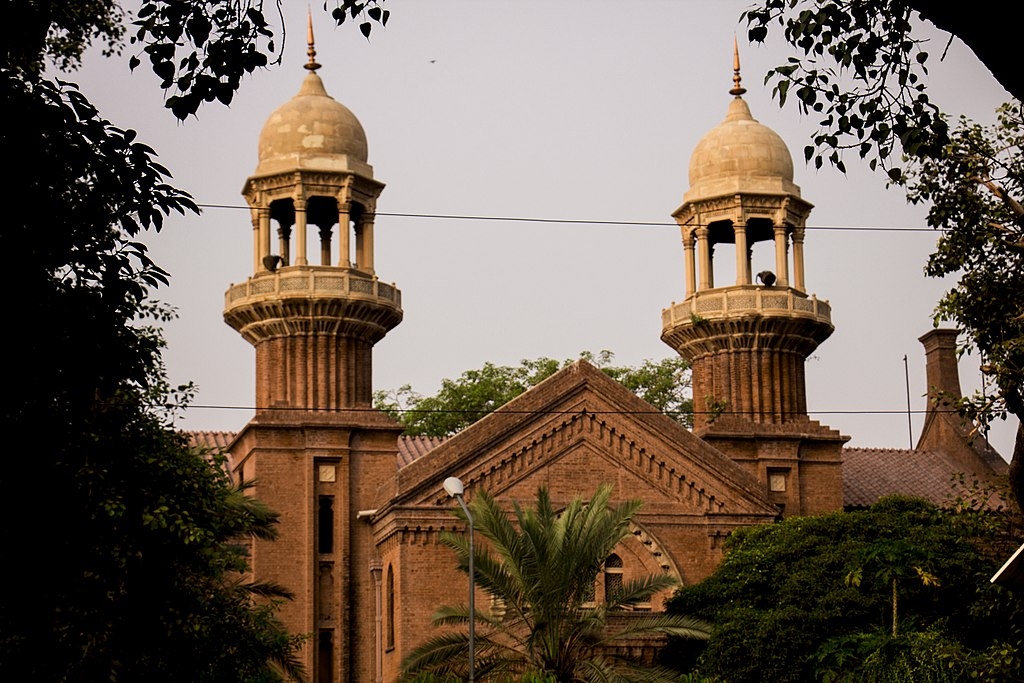 Pictured: The Lahore High Court Building in Lahore, Pakistan. (Image source: MariyamAftab/Wikimedia Commons) |
On June 8, the Lahore High Court in Pakistan upheld the death sentence of two Christian brothers, Qaiser Ayub and Amoon Ayub, in a blasphemy case.
They were accused of posting blasphemous contents on the internet; in June 2011, the complainant, Muhammad Saeed, submitted an application at the police station in Talagang to register a case against the Ayub brothers.
Saeed told the police that while he was browsing the internet, he saw blasphemous content posted by Qaiser Ayub on June 9, 2011, and a case was registered against the Ayub brothers under sections 295A, 295B, and 295C.
In December 2018, a trial court found them guilty of posting blasphemous content on their blog. Judge Javed Iqbal Bosal sentenced them to death, with a 100,000 rupee (USD $719) fine.
The brothers have maintained their innocence, and say the allegations came after a fight had broken out between Qaiser Ayub's Muslim friends over one of the friend's sisters.
Amoon Ayub believes his brother's Muslim friends, Zaryab Sheikh and Sheraz Qureshi, created the website using his information, to settle the score.
The Centre for Legal Aid Assistance & Settlement (CLAAS) submitted an appeal to the High Court against the death sentence. On February 28, 2022, the Lahore High Court Rawalpindi Bench, comprising Justice Raja Shahid Mehmood Abbasi and Justice Chaudhry Abdul Aziz, heard the appeal and reserved the judgment, which was announced on June 8, upholding the Ayub's death sentences.
CLAAS's team in Pakistan has visited the brothers in prison and Qaiser has signed a power of attorney, and now CLAAS is taking this case before the Supreme Court, with the hope that it will do justice for them and God willing, they will be freed.
Nasir Saeed, director of CLAAS-UK, has said that the CLAAS team in Pakistan met the brothers in prison and when they were told about the decision of the high court, Amoon burst into tears while Qaiser also became very sad. Their reaction was natural. Saeed added:
"We all were hoping that because the court had reserved the verdict, and because they were taking so long to announce it, blasphemy charges against them would be dropped and both would be freed.
"But to the contrary, the High court upheld their death sentence. Both brothers were looking weak as they are already suffering from health issues.
"The brothers have signed the power of attorney, we are taking this case to the Pakistan Supreme court and are very hopeful that justice will be done and they will be freed. Unfortunately, we cannot tell how long it will take but we are hopeful that the country's highest court will do justice.
"This will be the 3rd case of blasphemy which will be heard by the supreme court. We still believe that the brothers are innocent and it has not been proved that they had published any blasphemous contents.
"Instead Muhammed Saeed, who already had some rivalry with them, claimed Qaiser had posted blasphemous contents on the internet. He informed the police, and the brothers were charged under the blasphemy law."
The blasphemy law has a mandatory death penalty and has become a very sensitive and inflammatory issue in Pakistan. Mere blasphemy allegations often provoke mob violence and lynching of suspects, while those who make false accusations of blasphemy are never asked questions.
Religious intolerance has grown in Pakistan, and people take the law into their own hands without hesitation.
Lynching and vigilante justice have become everyday phenomena in Pakistan. Because of the government's inaction and support from hardline religious groups, criminals are encouraged and continue killing innocent people with impunity.
Those who take the law into their own hands are considered heroes, as we have seen in the case of Punjab Province Governor Salman Taseer, who was murdered by his own bodyguard, Malik Mumtaz Qadri. Every time Qadri attended a court hearing, people would shower rose petals on him. Two senior retired judges, Khawaja Mohammad Sharif, former chief justice of the Lahore High Court (LHC) and former LHC judge Mian Nazeer Akhtar, represented the murderer in court.
CLAAS is among the organisations that have been campaigning to end the ongoing misuse of the blasphemy law for years. The Pakistani government is aware of its misuse but has unfortunately failed to bring any changes to the law or stop its misuse.
The article was originally released by the Centre for Legal Aid Assistance & Settlement and is reprinted here by the kind permission of author.


